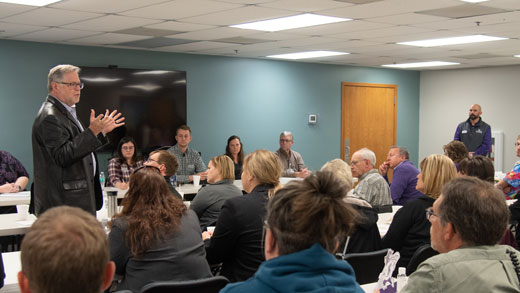January 17, 2023
Community visit spotlight: Ellsworth community partners increase awareness of mental health
 |
Bradley Dirks, associate director of K-State's Physician Assistant Program and K-State Research and Extension behavioral health specialist, discusses the dire need to address mental health challenges in Kansas. |
It is no surprise the topic of mental health continues to be at the forefront of many conversations. Rates of anxiety, depression and substance use disorder have increased since the beginning of the pandemic, and for rural communities in Kansas, this rise in urgency has been difficult to navigate for a multitude of reasons.
A recent study by Mental Health America ranks Kansas last in the nation when it comes to accessing mental health resources. This study ranks states, plus Washington, D.C. by the prevalence of mental illness and access to care. Factors such as accessibility, availability, affordability and acceptability are challenges in finding adequate care for mental health services, especially in rural communities. For this reason, local Ellsworth County agencies have proactively come together to address challenges in their rural communities.
In summer 2022, local agencies formed the Because We Care Coalition with goals to address mental health stigma, awareness and accessibility. Coalition members represent local agencies working in a variety of sectors in the county.
During the Central Kansas regional community visit, coalition members along with representatives from K-State Research and Extensions Stress and Resiliency Transdisciplinary team talked as a panel with President Richard Linton and community members on challenges and areas of opportunity to advance this work.
Jessica Kootz, Midway Extension District director, described the significance of this coalition coming together.
"Through the transition of COVID, the focus of our [leadership] group also transitioned, as we identified the lingering effects of the pandemic were related to mental health and community access to resources," Kootz said. "The group Because We Care was formed at that time and was reenergized after the hospital's Community Health Needs Assessment identified mental health as a top concern for the community. Because the coalition was already gathered and already had a track record of success and partnership, it was easy to ignite the fire."
Since starting with K-State Research and Extension, Kootz said there had been more conversation surrounding the importance of mental health.
"It's seemed that the way we relayed the information to our community has been in an almost nonchalant way through trainings, displays and newspaper articles," Kootz said. "This community visit seemed like the perfect opportunity to make a little noise around the topic of mental health and increase awareness on what we are actively doing about the mental health crisis at the community level, as well as through our statewide extension efforts."
"Mental health is the least funded 'disease' we have, yet it has the potential to become our very own local pandemic," said Jim Kirkbride, coalition member and Ellsworth County Medical Center CEO.
The rate of suicide in Kansas increased by 70% between 2000 and 2018 and is the second leading cause of death among 15–34-year olds in Kansas.
"There is a need to understand that these are life and death issues," said Bradley Dirks, associate director of K-State's Physician Assistant Program and K-State Research and Extension behavioral health specialist. "Kansas ranks among the lowest states with respect to the availability of mental health resources."
Dirks along with Rachael Clews, KSRE southwest family and consumer science regional specialist and co-chair of KSRE's Stress and Resiliency Transdisciplinary team, discussed Extension's initiative to slow down these alarming statistics. KSRE's Stress and Resiliency Transdisciplinary team provides suicide prevention training to KSRE agents and community partners with programs such as QPR — Question. Persuade. Refer — and Mental Health First Aid. Objectives center around reducing suicidal behaviors and saving lives by recognizing signs of crisis, which can be all around us. Clews stressed that quality education empowers all people, regardless of their background, to make a positive difference in the life of someone they know. Positive results from this initiative show an increase in participant knowledge in locating local mental health resources upon completion of suicide prevention trainings.
Other key issues and points highlighted during the visit included the importance of having resources available not only to the public but to K-State faculty, staff and students as mental health affects all walks of life. Multisector partners stressed that more careers needed mental well-being training to recognize when others were in need. Dirks acknowledged the significance of training career fields in mental well-being and stated K-State students in the new Physician Assistant Program carefully train to recognize, diagnose and properly treat mental health conditions. Physician assistant students must complete a required clinical rotation in psychiatry/behavioral health as part of their curriculum. Committing to K-State's mission to prepare future professionals in their respective fields.
Kathleen Hatch, Morrison Family associate vice president for student well-being, continues these efforts as well for the K-State campus community. Hatch helps to align programs and services within Student Life. She elevates awareness on campus on a range of topics including mental, emotional and physical health, food insecurity, financial well-being, and access and accommodations.
Hatch said they are in the early stages of adopting a holistic model and campus approach to help the K-State community increase its capacity while inspiring communitywide efforts. Contact Hatch at kehatch@k-state.edu or Chris Bowman, director of the Morrison Family Center for Student Well-being, at cbowman@k-state.edu for any additional information, faculty/staff training, etc.
Explore K-State's regional community visits and engagement partnerships through our StoryMap or find complete information about regional community visits. As K-State faculty, staff and/or students, are you interested or currently immersed in university-community engagement work? Contact the Office of Engagement for opportunities to begin or grow your scholarly work.
